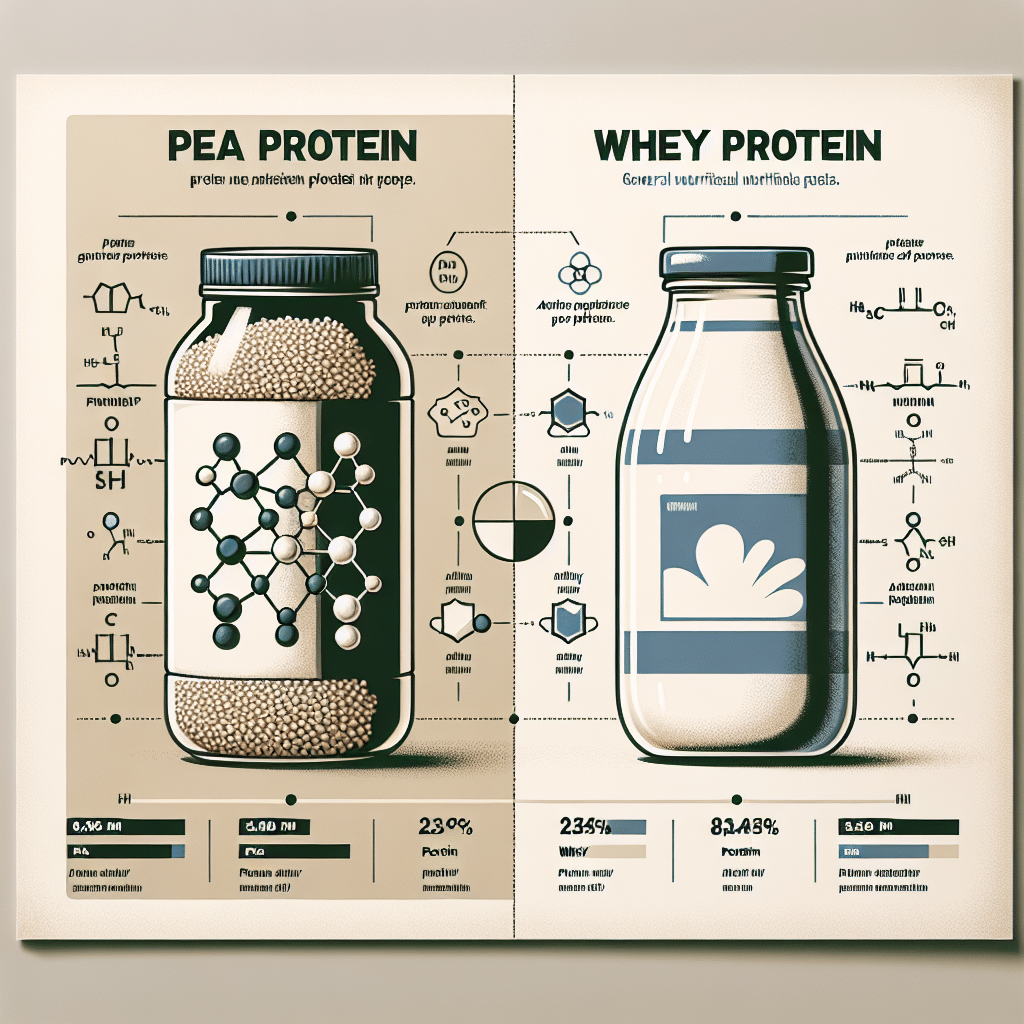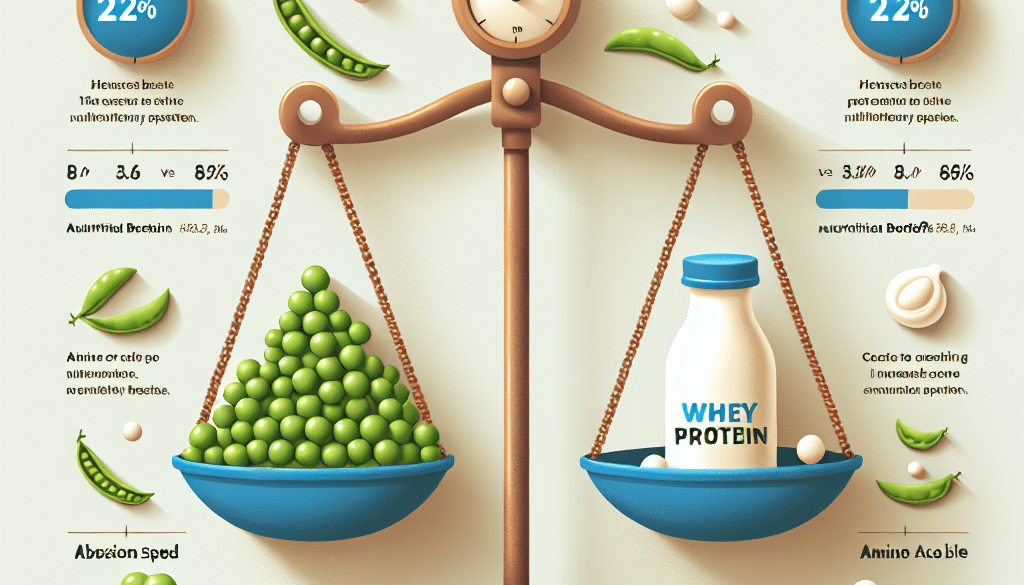Why Is Pea Protein Not As Good As Whey?
-
Table of Contents
- Pea Protein vs. Whey: Understanding the Differences
- Complete vs. Incomplete Protein Sources
- Biological Value and Absorption
- Digestibility and Allergenic Potential
- Nutritional Content and Health Benefits
- Environmental Impact and Sustainability
- Case Studies and Research
- Conclusion: Weighing the Pros and Cons
- Discover ETprotein’s Premium Protein Products
Pea Protein vs. Whey: Understanding the Differences

Protein supplements are a staple in the diets of athletes, bodybuilders, and health enthusiasts. Among the plethora of options available, whey protein has long been the gold standard for its high-quality amino acid profile and digestibility. However, with the rise of plant-based diets, pea protein has emerged as a popular alternative. Despite its growing popularity, there are several reasons why pea protein may not measure up to whey protein’s effectiveness.
Complete vs. Incomplete Protein Sources
One of the primary differences between whey and pea protein lies in their amino acid profiles. Amino acids are the building blocks of protein, and there are nine essential amino acids that the body cannot produce on its own. These must be obtained through diet.
- Whey Protein: Whey is a complete protein, meaning it contains all nine essential amino acids in sufficient quantities. This makes it highly effective for muscle repair and growth.
- Pea Protein: While pea protein is rich in many essential amino acids, it is low in methionine. This makes it an incomplete protein, potentially limiting its effectiveness in supporting muscle synthesis when not combined with other protein sources.
Biological Value and Absorption
The biological value (BV) of a protein indicates how efficiently the body can use it for tissue formation. Whey protein boasts a high BV, meaning the body can readily absorb and utilize it.
- Whey Protein: With a BV of around 104, whey protein is one of the most efficiently absorbed proteins, making it ideal for post-workout recovery.
- Pea Protein: Pea protein has a lower BV compared to whey, which may result in less efficient uptake and utilization by the body.
Digestibility and Allergenic Potential
Protein digestibility is crucial for ensuring the body receives the necessary amino acids. However, digestibility can be affected by allergies and intolerances.
- Whey Protein: Whey is derived from milk and can cause issues for individuals with lactose intolerance or milk allergies. However, whey isolate, a more refined form, contains minimal lactose and may be better tolerated.
- Pea Protein: Pea protein is hypoallergenic and may be a suitable alternative for those with dairy allergies. However, its fiber content can sometimes lead to gastrointestinal discomfort in sensitive individuals.
Nutritional Content and Health Benefits
Both whey and pea proteins offer additional health benefits beyond muscle building.
- Whey Protein: Whey is rich in branched-chain amino acids (BCAAs), particularly leucine, which is critical for muscle protein synthesis. It also contains bioactive compounds that may have immune-boosting properties.
- Pea Protein: Pea protein is often praised for its iron content and is considered beneficial for heart health due to its hypoallergenic and cholesterol-free nature.
Environmental Impact and Sustainability
While not directly related to nutritional quality, the environmental impact of protein sources is an important consideration for many consumers.
- Whey Protein: Dairy farming has a significant environmental footprint, including high water usage and greenhouse gas emissions.
- Pea Protein: Pea protein is generally considered more sustainable, with a lower carbon footprint and less water usage compared to animal-based proteins.
Case Studies and Research
Several studies have compared the effects of whey and pea proteins on muscle growth and recovery. For instance, a 2015 study published in the Journal of the International Society of Sports Nutrition found that pea protein supplementation was as effective as whey protein in terms of muscle thickness gains in participants. However, it’s important to note that the study participants were also engaged in resistance training, which could influence results.
Another study highlighted that while pea protein can support muscle growth, the higher leucine content in whey protein might lead to more rapid muscle protein synthesis post-exercise. This suggests that while pea protein can be a viable alternative, whey may have the edge in certain aspects of muscle recovery.
Conclusion: Weighing the Pros and Cons
In conclusion, while pea protein offers a plant-based alternative with certain health and environmental benefits, whey protein remains superior in terms of its complete amino acid profile, higher biological value, and faster absorption rate. For individuals seeking maximum muscle growth and recovery, whey protein is likely the better choice, provided there are no dietary restrictions or allergies. However, for those who prefer plant-based nutrition or have dairy sensitivities, pea protein can still be an effective part of a well-rounded diet when combined with other protein sources to ensure a complete amino acid profile.
Discover ETprotein’s Premium Protein Products
If you’re looking for high-quality protein supplements, ETprotein offers a range of products to meet your needs. Whether you prefer plant-based options like pea protein or animal-derived whey, ETprotein’s commitment to purity, taste, and allergen-free attributes ensures that you’re getting the best on the market. Explore their extensive selection to find the perfect fit for your dietary preferences and nutritional goals.
About ETprotein:
ETprotein, a reputable protein and L-(+)-Ergothioneine (EGT) Chinese factory manufacturer and supplier, is renowned for producing, stocking, exporting, and delivering the highest quality organic bulk vegan proteins and L-(+)-Ergothioneine. They include Organic rice protein, clear rice protein, pea protein, clear pea protein, watermelon seed protein, pumpkin seed protein, sunflower seed protein, mung bean protein, peanut protein, and L-(+)-Ergothioneine EGT Pharmaceutical grade, L-(+)-Ergothioneine EGT food grade, L-(+)-Ergothioneine EGT cosmetic grade, L-(+)-Ergothioneine EGT reference grade and L-(+)-Ergothioneine EGT standard. Their offerings, characterized by a neutral taste, non-GMO, allergen-free attributes, with L-(+)-Ergothioneine purity over 98%, 99%, cater to a diverse range of industries. They serve nutraceutical, pharmaceutical, cosmeceutical, veterinary, as well as food and beverage finished product distributors, traders, and manufacturers across Europe, USA, Canada, Australia, Thailand, Japan, Korea, Brazil, and Chile, among others.
ETprotein specialization includes exporting and delivering tailor-made protein powder and finished nutritional supplements. Their extensive product range covers sectors like Food and Beverage, Sports Nutrition, Weight Management, Dietary Supplements, Health and Wellness Products, and Infant Formula, ensuring comprehensive solutions to meet all your protein needs.
As a trusted company by leading global food and beverage brands and Fortune 500 companies, ETprotein reinforces China’s reputation in the global arena. For more information or to sample their products, please contact them and email sales(at)ETprotein.com today.












